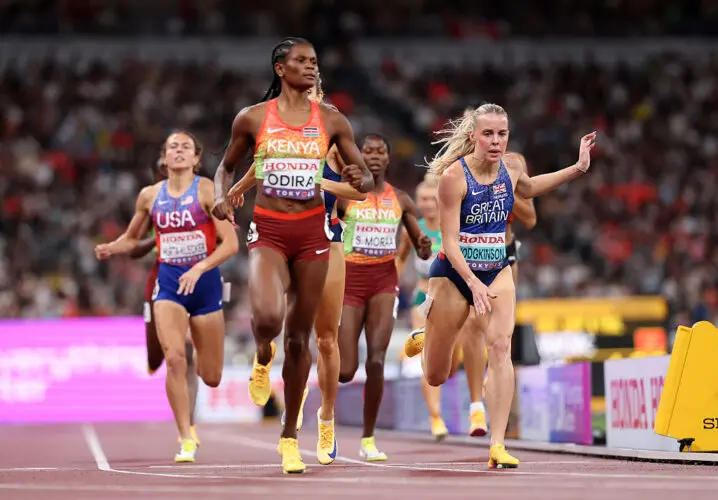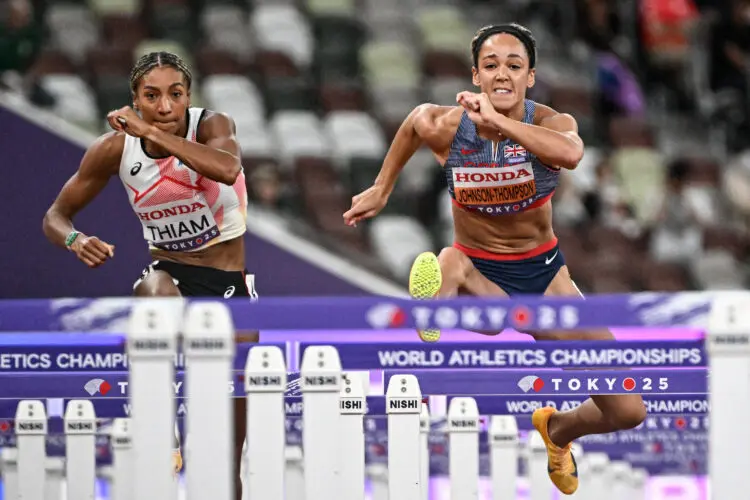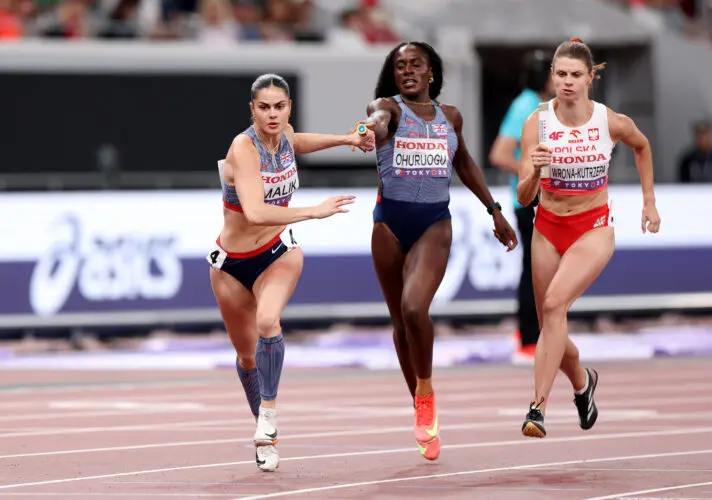While there were some World Championships success stories to celebrate, there were also areas of concern and confusion, writes Katharine Merry.
There’s a lot to consider about the performance of the British team in Tokyo. We saw some really good, some bad and a little bit of ugly over the course of the nine days of competition.
Let’s start on a positive note. The silver medals for Jake Wightman in the 1500m and Amy Hunt in the 200m were outstanding and both great stories in their own right, plus I think Keely Hodgkinson winning bronze after such a difficult injury-affected year was remarkable.
However, I think that all of the attention being placed on the Olympic champion meant that the achievement of her training partner Georgia Hunter Bell winning 800m silver was slightly overlooked.
After Keely had come back from such a long break and hit the ground running so well, the question being asked before the championships was: ‘Who’s going to finish behind her?’
People were starting to wonder about the possibility of a British one-two, last done at a world championships by Christine Ohuruogu and Nicola Sanders in the 400m in 2007.
But, having seen how they were both running in Tokyo, I did start to wonder if Georgia might have the edge. It was the semi-finals that made me think this could actually go the other way and that the lack of racing was starting to catch up with Keely.
In the final, Keely did extraordinarily well to run 1:54 and the third-fastest time of her career, but she couldn’t cater for that finish from Kenya’s Lilian Odira. No-one saw that coming.
Georgia, meanwhile, ran the race of her life. She just went about her business and ran superbly – vindicating her decision to focus solely on the 800m rather than the 1500m.
 Lilian Odira wins the 800m as Keely Hodgkinson lunges for the line (Getty)
Lilian Odira wins the 800m as Keely Hodgkinson lunges for the line (Getty)
I thought it was great that, having won Olympic 1500m bronze last year, she decided to mix things up. She didn’t have anything to lose. There wasn’t the same pressure and expectation.
But what she has done is a real throwback to Kelly Holmes and, of course, the days of Coe, Cram and Ovett. So I suppose the question I’m sure she’s asking to her coaching team of Trevor Painter and Jenny Meadows is: “Which is my better event? Which is the one that can bear the most fruit?” And I hope that they say: “Both of them.”
It’s a very unique skill to be able to do what she’s done and it’s very, very impressive – especially when you consider the time she took out of the sport and really hasn’t been a full-time athlete for very long. It’s nice when people do things differently, isn’t it?
Keely was disappointed at coming third, and I was delighted to see that reaction because it says so much about her. I would add that all of her opponents should watch out – she’s going to be a woman on a mission next year!
 Nafi Thiam and Katarina Johnson-Thompson (Getty)
Nafi Thiam and Katarina Johnson-Thompson (Getty)
Another British performance that I feel went a little bit under the radar was Katarina Johnson-Thompson coming third in the heptathlon.
She’s a double world champion and Olympic silver medallist but the longevity she has managed to achieve at the very top level is absolutely exceptional. It’s hard to overstate the work and dedication involved in being able to do that, especially in the combined events which test your body in every conceivable way.
Finishing 21st on the table was not the pre-championships aim for Britain. Their tally was 10 two years ago in Budapest and six of those were individual while four of them came from the relays. In Tokyo, five were individual but obviously the relays didn’t go to plan – a stark contrast to the Olympics last year when Britain won a medal in every single relay.
We also need to acknowledge that a couple of the big players who were likely medallists – Molly Caudery and Josh Kerr – were unlucky with injuries, while Matt Hudson-Smith was clearly out of form and not completely right.
Everyone’s going to concentrate on the fact that there wasn’t a gold medal for the first time in 22 years, and I get that, but I also think it’s important to look past that and, when you do, the performances were still decent. If you look at the placings table, Britain were fourth.
There are clear and obvious reasons to explain why we didn’t get a gold medal. What isn’t quite so easy to explain is some of the thinking when it came to the relays. Some athletes are funded purely off the back of their places in the relay squads.
 Poppy Malik & Victoria Ohuruogu (Getty)
Poppy Malik & Victoria Ohuruogu (Getty)
Yes, we can all have off days and make mistakes – and that definitely happened – but it’s the 4x400m selections that I found most confusing. You don’t know about the behind the scenes conversations and the thinking, but when you come in last in the heat of the women’s 4x400m, what’s going on?
Across all of the longer relays, there were rested athletes who weren’t used and I don’t understand why they didn’t run. Was that an athlete decision or a management decision? There’s a level of frustration and confusion when we’re not 100 per cent sure why.
You can’t rest people for the final when you’ve got to make sure you get there first and we didn’t have the depth this year to rest as many people as we did. It stings a bit. I remember I was rested at the 1999 World Championships and we didn’t qualify for the final. I wanted to run the heat and they said they were saving me. “Saving me for what? This is my job!”
Year on year, it’s becoming increasingly difficult to win a medal at world level and hopefully some valuable lessons have been learned from Tokyo. Britain does have undoubted areas of strength but there were other events that either weren’t good at all or, in the case of many of the technical events, there was no British representation in the first place. That, rather than the absence of a gold medal, should be the biggest cause for long-term concern.


AloJapan.com